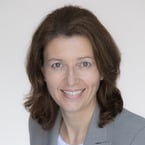
Claudia K. Petritsch, PhD, is currently an associate professor in research of neurosurgery at Stanford University School of Medicine Department of Neurosurgery. She received her BS and MS from the University of Vienna followed by a PhD degree at the Institute for Molecular Pathology (owned by Boehringer Ingelheim) in Vienna, Austria. Her postdoctoral work on neural stem cells and asymmetric division at the University of California Howard Hughes Medical Institute in the lab of Drs Yuh Nung and Lily Jan was funded by the Human Frontiers Science Foundation (HFSP) and the European Molecular Biology Organization (EMBO).
As lecturer and principal investigator at the GeneCenter Ludwig Maximilian University in Munich, Germany, she lead the effort to live image asymmetric protein distribution in stem cells. As faculty in the department of neurosurgery at UCSF her team discovered that deregulation of asymmetric cell division contributes to brain tumorigenesis. After moving to Stanford University in 2019, her team build a biorepository of surgical viable tissue from 160+ brain tumor and epilepsy cases that provides tools for basic and translational brain tumor research. Her basic and translational research on stem cells in brain tumors uses primary, patient-derived cell lines and xenografts and genetically engineered mouse models.
Dr. Petritsch has received grant funding from the NIH/NCI/NINDS, the American Cancer Society, the American Brain Tumor Association, the National Brain Tumor Foundation, California Breast Cancer Research Program, Voices Against Brain Cancer, Women’s Health and Sex Differences in Medicine (WHSDM) Stanford. She directs the Stanford Pediatrics Cancer Model Development Center and CNS Tumor Biorepository. As a member of the Society for Neuro-oncology she participates in mentoring events. She had the privilege to receive mentorship and support from teachers, supervisors, and peers without which her work would not be possible. Dr. Petritsch hopes to give back by mentoring researchers and she is a firm believer that diversity, inclusivity, and equal opportunities are critical foundation for advancing cancer research.